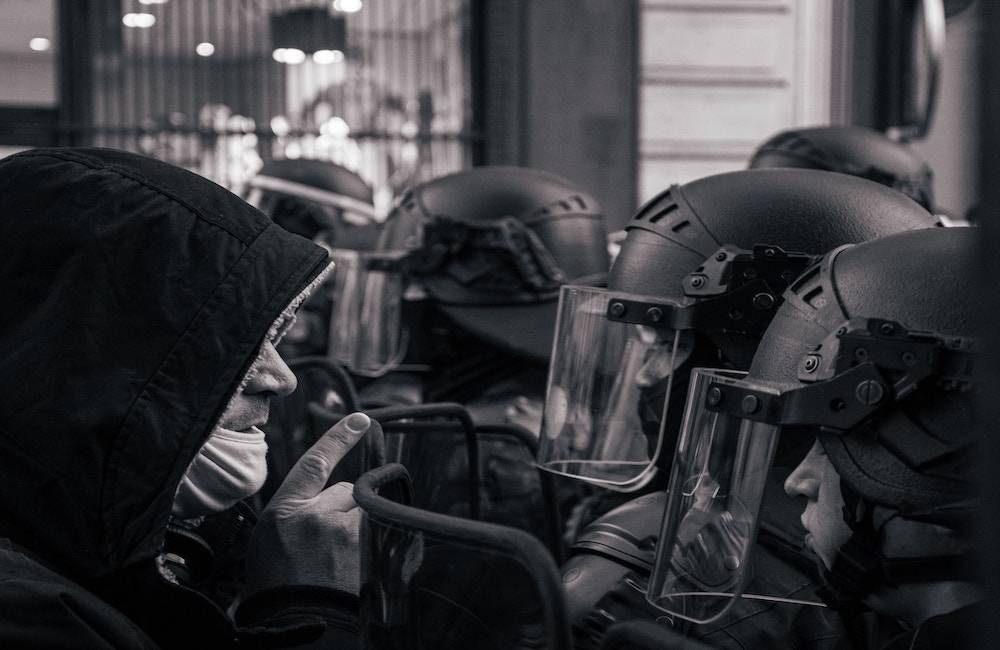The recent protests in France have exposed a deep social divide between native French citizens and the immigrant community from North Africa. These disturbances followed a wave of urban violence that broke out last week, sparked by the police-perpetrated murder of Nael Al-Marzouki, a young French man of Algerian origin. Al-Marzouki tragically lost his life on June 27th on Nelson Mandela Square, located in Nanterre, a Parisian suburb. In the wake of this event, the United Nations urged France to address the deeply rooted issues of racism and discrimination within its security forces.
This situation is not new for France. Indeed, on October 6, 2005, similar riots broke out, striking at the heart of the capital, Paris, and spreading through many French cities. These disturbances were a direct reaction to the deaths of two young people of North African origin, electrocuted in an electrical substation while fleeing from French police.
At the time, French Interior Minister Nicolas Sarkozy's description of the protesters as "rabble" caused significant outrage. French authorities were then forced to declare a state of emergency, a measure that remained in effect for nearly three months. Although the riots were short-lived, lasting only a few days, they left behind a heavy toll: dozens of vandalized shops, restaurants, and public buildings, over 150 targeted police stations, thousands of burnt-out vehicles, and hundreds of injured officers and security forces members.
However, it's no longer surprising to see violent protests orchestrated by individuals of African origin recurring. If this testifies to anything, it is the deep divide between native French citizens and those who have immigrated to France, especially from North Africa. So what are the factors that have contributed to this situation?
Racial Discrimination: A Persistent Reality
Since 1945, France has been marked by successive waves of immigration aiming to fill its labor needs, particularly in skilled sectors. Following Algeria's independence in 1962, the flow of immigrants into France significantly increased to compensate for the shortage of workers, especially in the high-risk mining and industrial sectors that garnered little interest among French citizens, such as automotive and chemical industries.
Starting from 1974, the "family reunification" laws resulted in an unprecedented increase in the number of immigrants in France, leading to a major housing crisis. Concurrently, the closure of mines and certain industrial factories, along with mass layoffs, led to a rise in unemployment rates. Furthermore, tax increases for high-income individuals, imposed by the French government, forced many of them to move to other regions, thus driving a demographic transformation in French suburbs.
All these circumstances contributed to a culture of racial discrimination towards immigrant communities in France, particularly those from North Africa. Even within the police and security forces, this discrimination was observed, as acknowledged by the then French Interior Minister, Christophe Castaner, who called for action against instances of racism within law enforcement.
Inequalities and Social Injustices: Lingering Woes
The recent riots in France have brought to light the burning social tensions stirring within the country. Clashes with security forces have spread to nearly a hundred cities across the entire territory, despite the government deploying 45,000 officers to manage the situation. These events uncover deeply rooted social and economic issues, especially in the suburbs, highlighting the long-term legacy of authorities' neglect in these regions.
What sets these riots apart from previous ones is the predominance of young people from immigrant backgrounds among those accused of violence and vandalism, according to authorities. About a third of those arrested by security forces were under eighteen years old. Many protesters justified their actions as a response to social injustice, expressing their anger by attacking public property, setting cars on fire, looting stores, and clashing with the police. Others voiced their discontent about indifference towards their living conditions and demanded justice and equality, hoping that these acts of violence would compel the government to acknowledge its mistakes and take corrective action.
During this time, extensive media coverage and inflammatory statements from far-right politicians, known for their anti-immigration stance, greatly exacerbated the tensions. This forced French President Emmanuel Macron and his government to quickly respond to defuse the situation, thereby breaking away from the approach adopted by Sarkozy in 2005. Macron limited himself to describing Al-Marzouki's murder as an unforgivable act, while French authorities proceeded to arrest the police officer shooter, charging him with premeditated murder. Despite video footage of the incident contradicting the officer's claim of acting in self-defense, right-wing parties and some police members persisted in accusing Macron of betrayal and failing to support their ranks.
Divergence of Ideologies: Clashing Visions
Since taking office in 2017, Emmanuel Macron has faced a series of protests that reflect the profound social and economic problems the country is grappling with. In May 2018, barely a year after his election, the "Yellow Vest" movement emerged, demanding tax relief and wage increases. Then, in January of this year, significant protests erupted, organized by opponents to the pension reform proposed by Macron's government, which planned to push back the retirement age from 62 to 64 years old.
However, one of the major challenges facing migrants from North Africa, particularly the poorest and least educated, lies in their difficulty aligning with the French Republican ideology, centered around liberty, equality, and secularism, which has become a fundamental pillar of French doctrine. By refusing to adopt this ideology and fully integrate into French society, their community is exposed to racial discrimination and heightened unemployment.
Focus on "France 2030"
Despite the efforts made by the French government since 2005 to broaden policies against racial discrimination following the riots that shook the country, and despite Macron's multiple economic and social successes, including the drop in unemployment rate since he took office in 2017, poverty, crime, racial discrimination, and poor school performance persist within the most disadvantaged immigrant communities.
But that's not all. Last weekend, following the recent protests, two leading police unions in France released an inflammatory statement full of hate and racism towards French people of African origin, proclaiming: "We are at war against hordes of insects." In addition, far-right leader Eric Zemmour called on authorities to crack down on protesters who he, like many French politicians, deems responsible for the country's problems.
In summary, given these factors, it appears that the series of protests in France will not end until all underlying causes are thoroughly addressed. Will Macron's announced "France 2030" strategy manage to revitalize disadvantaged immigrant neighborhoods after so far failing to bring about significant changes? The answer will be determined by the events to come.
Please post your comments on:
[email protected]
 Politics
Politics








